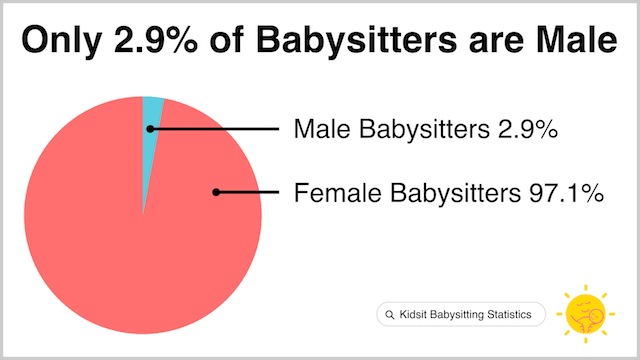Kidsit Babysitting Statistics


Written & Illustrated by
Matthew James Taylor
Kidsit Founder, General Manager
Statistics in this article are calculated weekly from our live member data
If you republish our statistics, please credit kidsit.com 😊
Common Childcare Services Offered By Babysitters
Babysitters often offer multiple childcare services to their clients. Babysitting is the most common at 98.10%, parent help at 40.66%, nannying at 33.33%, and au pair work is the least common at 3.62%.
| Type of childcare | Percent |
|---|---|
| 98.10% | |
| 40.66% | |
| 33.33% | |
| 3.62% |
Child Age Preferences Of Babysitters
Babysitters' favorite child age to work with is preschoolers at 89.47%, and the least favorite is teenagers at 36.31%.
| Child age | Percent |
|---|---|
| 45.74% | |
| 67.06% | |
| 83.70% | |
| 89.47% | |
| 84.78% | |
| 60.25% | |
| 36.31% |
Childcare Services Offered By Babysitters
Many babysitters offer extra services for children, sometimes at additional cost per hour.
| Childcare service | Percent |
|---|---|
| 48.87% | |
| 45.89% | |
| 27.47% | |
| 47.52% | |
| 56.62% | |
| 38.13% | |
| 21.09% | |
| 33.69% | |
| 51.96% | |
| 24.03% | |
| 43.06% | |
| 21.46% |
Household Services Offered By Babysitters
Babysitter can also provide a range of household services that can be a real help to busy families.
| Household service | Percent |
|---|---|
| 47.62% | |
| 36.93% | |
| 47.76% | |
| 24.83% | |
| 23.87% | |
| 65.95% | |
| 57.07% | |
| 37.81% | |
| 12.77% | |
| 14.78% |
Average Babysitting Rate Per Hour By Country
| Country | 1 Kid | 2 Kids | 3+ Kids |
|---|---|---|---|
| United States | $16.82 | $18.50 | $20.18 |
| Canada | $18.33 | $20.16 | $22 |
| United Kingdom | £11.38 | £12.52 | £13.66 |
| Australia | $26.83 | $29.51 | $32.20 |
| New Zealand | $22.74 | $25.01 | $27.29 |
See our babysitting pay rates guide for average rates in the top babysitting locations.
What Payment Methods Do Babysitters Prefer?
Here's what our babysitters said in a recent poll:

Babysitter Availability
Babysitters can be more or less difficut to book depending on the time and day of the week, if it's a special occasion, or if it's a school or public holiday.
Weekly availability
Evenings are the most available time for babysitters with Friday evening being the most popular. Overnight is the least available time with Tuesday night-time having the least sitters available.
Morn
Day
Arvo
Eve.
Nite
Special availability
Many babysitters are also available for special occasions and unique circumstances.
| When | Percent |
|---|---|
| 42.41% | |
| 44.14% | |
| 31.49% | |
| 21.22% | |
| 28.71% | |
| 26.01% | |
| 30.31% | |
| 17.66% | |
| 6.45% | |
| 31.15% | |
| 22.97% | |
| 26.47% |
Babysitting Qualifications And Credentials
The average babysitter is 23 years old, and has 5 years and 6 months experience working with children.
| Childcare credential | Percent |
|---|---|
| 9.12% | |
| 2.28% | |
| 25.76% | |
| 24.91% | |
| 14.98% | |
| 11.95% | |
| 7.19% | |
| 5.10% | |
| 8.88% | |
| 1.48% | |
| 2.75% | |
| 34.32% | |
| 21.62% | |
| 3.78% |
| General credential | Percent |
|---|---|
| 16.35% | |
| 28.74% | |
| 24.40% | |
| 7.93% | |
| 48.21% | |
| 27.40% | |
| 8.37% | |
| 8.98% |
Babysitter Skills And Interests
| Childcare credential | Percent |
|---|---|
| 40.78% | |
| 25.97% | |
| 26.74% | |
| 18.86% | |
| 47.86% | |
| 41.15% | |
| 45.69% | |
| 26.74% | |
| 21.32% | |
| 27.23% | |
| 35.00% | |
| 19.30% | |
| 41.62% | |
| 11.52% | |
| 12.24% | |
| 14.35% | |
| 26.90% | |
| 7.79% |
There are Hardly Any Male Babysitters

The disparity between how many men versus women are babysitters was greater than any other job I could find. A whopping 97.1% of all babysitters are female.
There could be several different societal reasons for this. Women are generally seen as the more nurturing and loving of the sexes. And babysitting isn't something that would be classified as a traditionally "masculine" job. So there could be a lot of stigma surrounding being a male babysitter. Men who babysit could face jokes and even insults or judgment from family and friends.
Many people also carry on the incorrect belief that male childcare providers are more likely to physically or sexually assault children in their care. On why this simply isn't true, check out my article Is it Safe to Hire a Male Babysitter? which goes in-depth on the topic.
Are you a male and thinking about becoming a babysitter? Read this article first Can Men Babysit? to learn why there aren’t many male babysitters, you can actually use this to your advantage.
Do People Consider Hiring A Male Babysitter?
To answer this, we polled our website visitors to see what they think:

Leaving Your Kids With A Babysitter Is Actually Pretty Safe

While male babysitters especially face a stigma, there's a general idea some people have that babysitters, in general, are unsafe. In my opinion, this is probably perpetuated by decades of movies and television shows which portray babysitters in a bad light.
If you watch any kind of entertainment with babysitters in it, they're usually portrayed as being incompetent and letting the kids they're watching get completely out of control. It's quite a popular comedy trope, and most shows have at least one episode where the kids are essentially jumping on the couch and eating ice cream while the babysitter is pulling their hair out. In other forms of media like horror movies, babysitters may be portrayed as the villain that treats kids poorly or steals from the family.
While a small minority of babysitters are bad apples, in general, these ideas about babysitters couldn't be further from the truth. Most babysitters are responsible, mature people who enjoy caring for kids or just need a part-time job. If you hire a babysitter that has completed a babysitting course as well as First Aid or CPR, it's very unlikely you'll have any kind of problem.
In fact, one study found that only 4.2% of all criminal offenses against children under age 6 were committed by babysitters. That's less than the percentage that either family members or strangers account for.
What Is The Main Purpose Of Your Resume?
We polled our babysitters to find out:

Childcare Is Most Common When Both Parents Work Outside The Home
71% of households where both partners work will pay for childcare for a preschool child (Source).
As kids get older, that number drops a bit to 49% for school-aged children (kids between ages of 5 and 14.)
Most parents (86%) who use child care arrangements do so on a regular basis. So if you're a babysitter, you should really be aiming to get recurring jobs where you work the same time and place every week, if possible.
Younger Babysitters Might Be More Prepared Than You Think
I think there's a common misconception that younger and less experienced babysitters are probably less safe to leave your kids with.
But a study from Penn State University on the emergency preparedness of 11 to 13-year-old babysitters shows that most of them are actually pretty prepared for dealing with tough situations (Source).
About half of the kids in that age range who are babysitters were trained in CPR and most had First Aid training. About 10% of them had even called 911 at some point!
Based on this study, I feel a bit safer with the idea of leaving my kids with a babysitter of that age. The biggest drawback the study pointed out for 11 to 13-year-old babysitters was a lack of attentiveness. So if you do hire younger babysitters, you probably just want to make sure your own children are old enough that a lack of attention won't cause any serious harm.
How young is too young to start babysitting? Check out my article What Age Can You Start Babysitting? (Laws & Maturity Requirements) for details!
Parents Want More Government Help With Childcare
More than two-thirds of Americans think that either the government or the businesses they work for should be doing more to help fund childcare for parents who work. However Congress in the US still pretty much fails to address this issue. And childcare funding in America tends to lag behind what's available in other developed countries like Canada, the UK, and Australia (Source).
The Word "Babysitter" Became A Thing In The 1930s
The word "babysitter" first showed up in the Oxford English Dictionary in 1937 (Source).
Even though terms like babysitter and babysitting only came into existence in the 1930s, it's actually one of the world's oldest professions. We just previously used other words like nanny, nurse, or childrearing to refer to the services that babysitters provide instead.
Another fun fact. The words house-sitter and pet-sitter are derived from the word babysitter.
How Many Babysitters Have Babysat Overnight?
We polled our babysitters to find out:

What Are The Most Useful Babysitting Documents?
According to the babysitters using our website they preferred the following:

Conclusion
Sometimes it's interesting to look into the studies and surveys that involve babysitting. In some cases, these statistics might just further back up what we thought we already knew. While other times, they might point out something completely counter-intuitive than what society normally believes about some aspect of babysitting.
What statistic from this list did you find the most surprising or interesting?
Babysitting is already a very fulfilling job if you care about kids. Check out my article Why Become a Babysitter? (11 Reasons Why it's a Fulfilling Job) to learn more. But now you can also add great pay to that list!

































